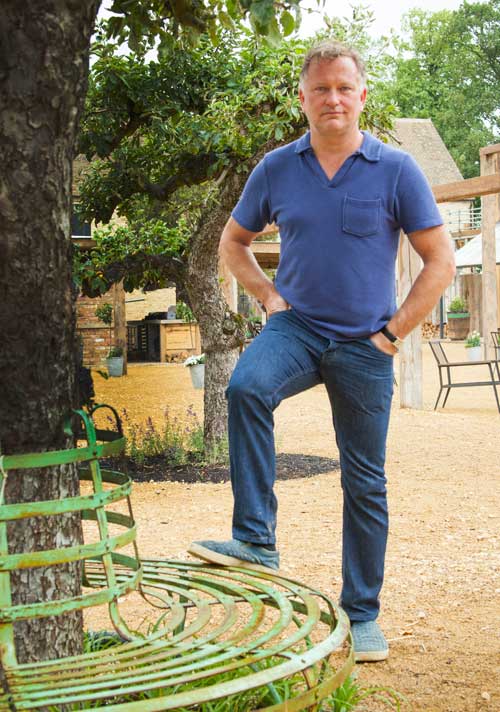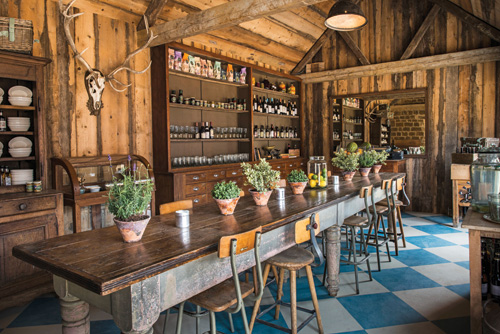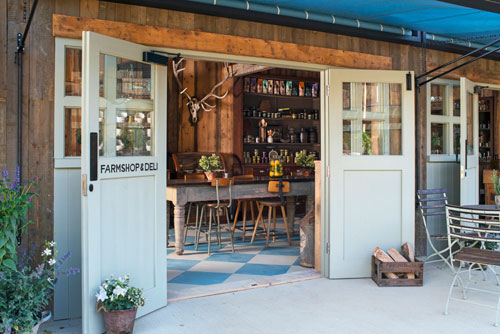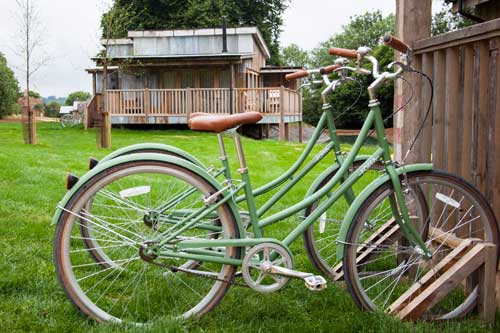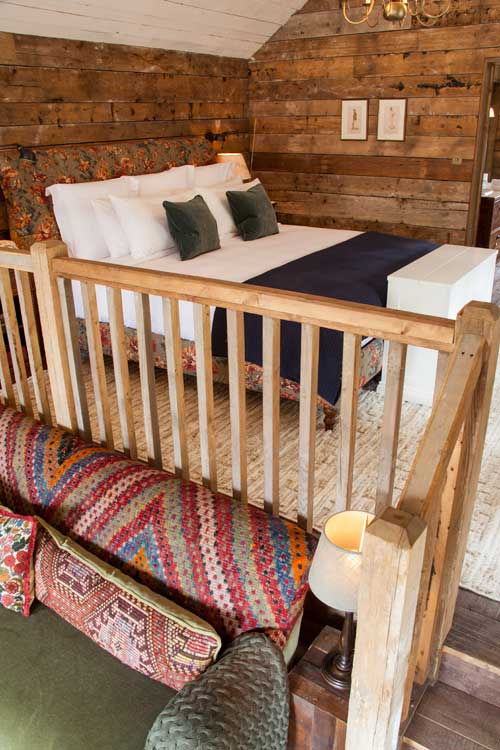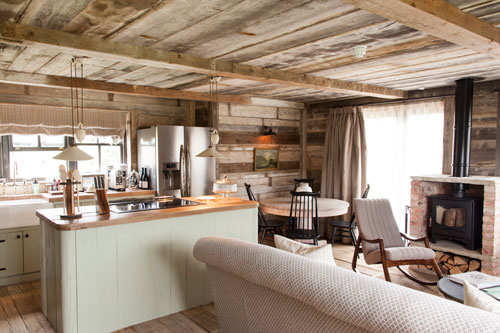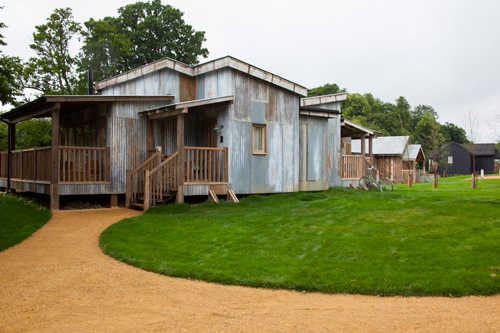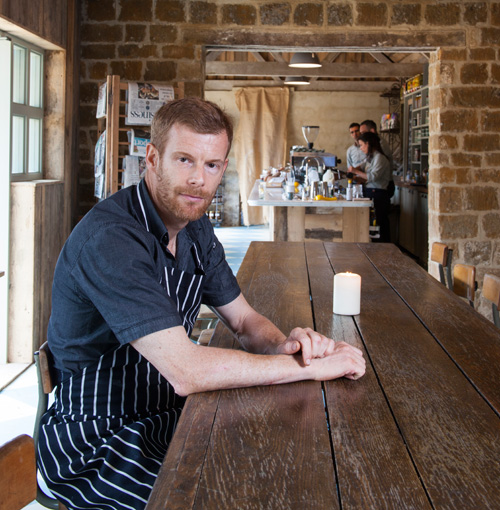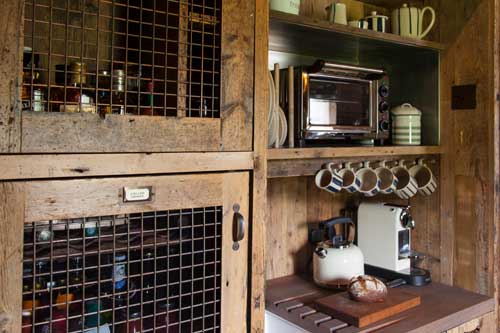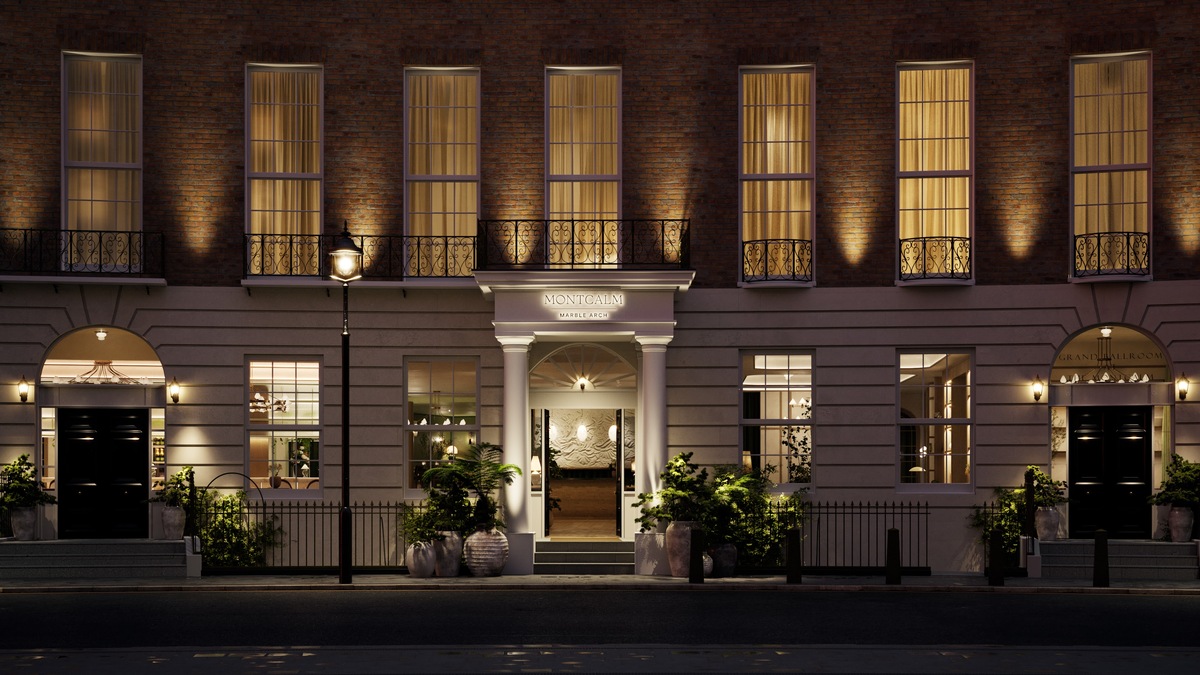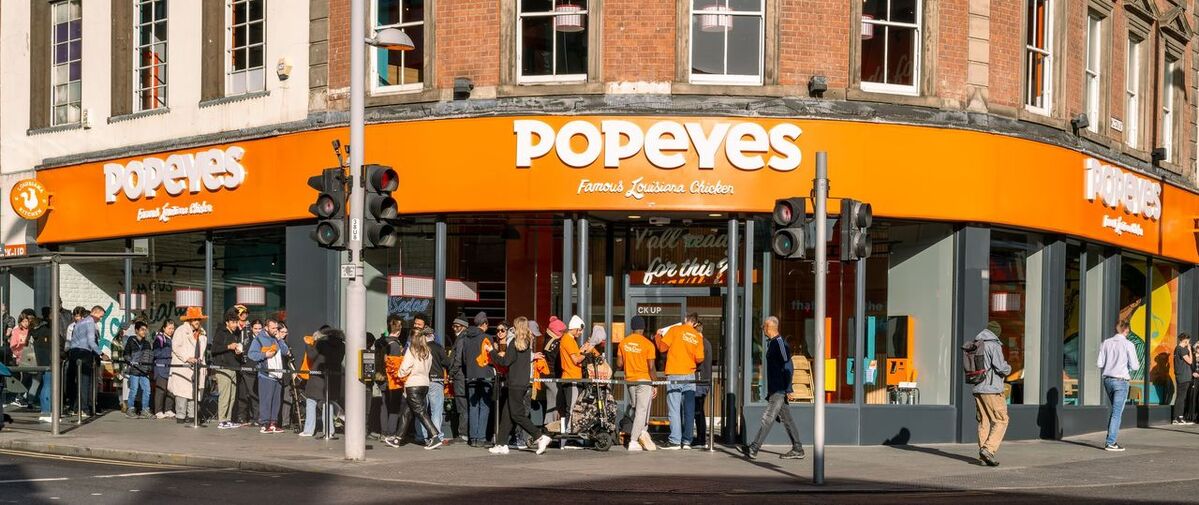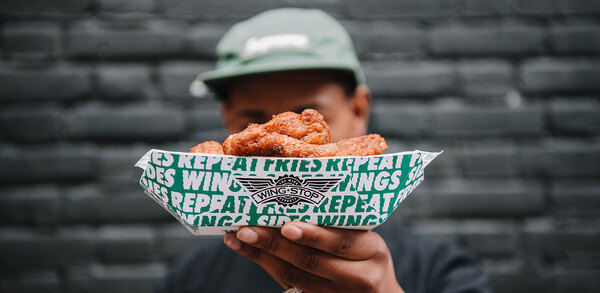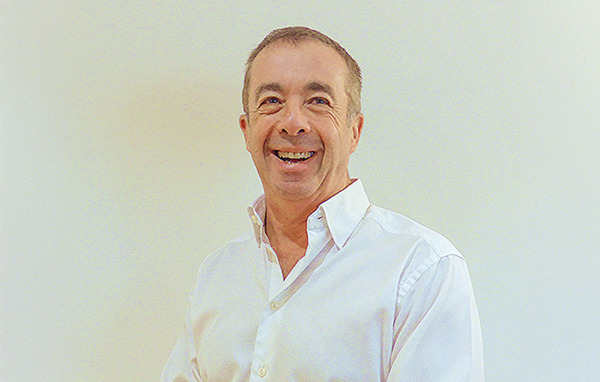Nick Jones on the opening of Soho Farmhouse
With its mix of rustic cabins, eating establishments and leisure facilities, Soho Farmhouse is the most ambitious hotel opening in the UK this year. Janet Harmer meets Soho House founder Nick Jones
Seventeen years after first shaking up the staid world of country house hotels with the launch of the laid-back, super-cool Babington House, Nick Jones has done it again.
Nestled within a 100-acre estate, Soho Farmhouse features 40 cabins of various sizes, which can accommodate up to 140 guests in total. They are spread out alongside bubbling brooks and lakes. However, it is the creation of what is effectively a village community that makes Soho Farmhouse stand out from anything previously seen in the UK.
Nick Jones
There is a selection of five eating venues, topped up with seasonal spaces and a fleet of 19 retro milk floats, delivering food and drink across the estate, along with a plethora of leisure activities. All this is centred around what is a cross between a stableyard and a market square, meaning there could be up to 600 guests on site at one time.
Jones, a man as laid back as the various environments within the Soho House & Co empire he heads, simply says that he wanted âto create something specialâ. This he has most definitely done, at a cost of £50m, on land acquired from the Great Tew estate.
Since it opened in Frome in Somerset in 1998, Babington House has enjoyed a year-round occupancy of 99%. âThe countryside has got a lot better recently with some interesting openings, and we knew there was demand for another country project,â Jones says.
It may seem hard to imagine now, as many others have since followed suit, but the launch of Babington House was revolutionary in the way it shrugged off the stiffness and suffocating chintz of what had come before. Soho Farmhouse is equally disruptive â" with bells on.
Some have already dubbed it as the posh personâs Center Parcs, and there is certainly a resort feel about the place thatâs heightened by the leisure facilities. While resort is a description Jones does not like, the vibe of Soho Farmhouse does have something in common with the kind of sprawling properties found in the rural outback of North America, as opposed to those with clipped lawns in the Caribbean. Whatever your take on it, you can bet that hospitality operators across the country will be eager to take a peek and see how Jones has, once again, created an environment where guests will clamour to stay.
In order to visit Soho Farmhouse, of course, one either has to be a club member or book in to stay as a hotel guest â" itâs no good just turning up for coffee or dinner. The club element of Soho House is one that came about by chance. When Jones was presented with the opportunity to launch a business on Greek Street in Soho, 20 years ago, the entrance to the building was deemed too small to be designated as a restaurant. Hence, what has gone on to become a global network of enormously successful private membersâ clubs, primarily aimed at people working in film, media and creative industries, was born.
âI never had a plan at the beginning, other than to survive,â Jones says in his typically self-effacing way.
Despite a seeming lack of foresight, the empire that Jones founded now numbers 15 clubs (10 with bedrooms) and 17 restaurant brands. The growth has been organic and entirely customer-led â" which appears to be the key to Soho Houseâs success.
âI do this business because Iâm passionate about people having a good time,â he says. âIt gives me a lot of satisfaction to have a room full of happy people â" it doesnât matter whether it is in the Chicken Shop in Tooting or Soho Beach House in Miami.â
Jones enjoys creating places that are all about quality, unpretentious surroundings and reasonable prices. Some may argue about the pricing â" the starting rate is £330 a night â" but Soho Farmhouse generally offers these qualities, and more, in abundance.
From the arrival at the gatehouse, where guests abandon their cars for the duration of their stay and are either transferred to reception by the aforementioned milk floats or horse and cart, it quickly becomes apparent that a stay at Soho Farmhouse is going to be unique experience.
As well as having a choice of one-, two- or three-bedroom cabins, there is also a seven-bedroom farmhouse (from £1,600 a night) and a four-bedroom cottage (from £900). While the latter two are conversions of original farm buildings, all the other cabins are newly constructed in a hotchpotch of wooden and corrugated iron-clad structures, carefully positioned to ensure privacy, their utilitarian nature belying the rustic glamour inside.
The fundamentals of the Soho House style are all here â" reclaimed timber floors and ceilings, wood-burning stoves, wrought iron chandeliers and huge, comfy sofas â" as is a great dollop of generosity, which, as far as Jones is concerned, is absolutely fundamental to a stand-out hotel. Bathroom amenities from Soho Houseâs own Cowshed brand are extensive in quantity and size, while the seven-foot beds are piled high with seven pillows.
At Babington, Jones was one of the first hoteliers to place a bath in a bedroom; here, some cabins have them on the patio, with no more than a simple curtain to protect oneâs modesty.
Furniture is either antique or made in-house, created by Soho Houseâs design team, led by group design director Vicky Charles. Jones himself is fully involved at every stage. âIt is important to stay involved with the detail, even more so when you get bigger,â he says.
Requests from members in recent years for details of the supplier of its beds and various furnishing accessories have resulted in Jones launching Soho Home. The new home furnishings store, initially launched at the Farmhouse, will eventually go online, enabling guests to furnish their own homes with bespoke Soho House items.
One of the most striking features of the cabins is the kitchen facilities â" ranging in size from a pantry to a fully-equipped space, featuring Stoves ranges, butler sinks, Magimix coffee makers, Dualit kettles and china specially manufactured by Whichford Pottery, located near Shipston-on-Stour, Warwickshire.
However, with such an extensive range of food and beverage options available on site, it is hard to know how well these facilities are being used. There is no doubt, though, that what is getting plenty of use is the variety of leisure facilities â" be it the Cowshed spa, steam room and sauna for those seeking total relaxation, or the AstroTurf tennis courts, crazy golf, five-a-side football pitch, stables and gym. When all that has been exhausted, there is a cinema, cookery school and shops, too.
It is always tricky to get the staffing right for any new venture, but the ambitious nature of Soho Farmhouse will make this more testing than most. Indeed, Jones recognises that ensuring service is consistent is going to be one of his biggest challenges.
However, if anyone is going to get it right, it will be Jones, according to Robin Hutson, the hotelier who created Hotel du Vin with Gerard Basset and the Pig group of hotels.
âNick is the master of thinking outside the box and his relentless eye for detail is second to none,â he says. âThere have been many copycats of his style over the years, but just when they think they have caught him up, he will reinvent with other twists. The range of very high-quality facilities is impressive.â
The estate needs some time to settle down from the recent building works and land- scaping, but Hutson has no doubt that Soho Farmhouse will be a success, as does Jones himself: the infrastructure is already in place for an additional 20 cabins.
Soho House & Co â" 20 years in the making
The £50m cost of developing Soho Farmhouse has been funded separately from the injection of cash into the business in 2012, which saw American investor Ron Burkle acquire a 60% stake in the firm for around £250m. As a result, Jones reduced his holding to 10%, with the remaining 30% held by Richard Caring, who heads Caprice Holdings, which owns Le Caprice, the Ivy and Scottâs.
A refinancing of the group in 2013, which resulted in an additional £130m of debt facilities, has enabled an ongoing expansion programme with Houses now established in North America, Berlin and Istanbul.
Despite now operating 15 clubs and 17 restaurant brands (including Cecconiâs, Dirty Burger and Pizza East), Jones hates to think of the business as a corporate entity. To this end, he has recently renamed the company from the Soho House Group to Soho House & Co. âIt indicates that we are a growing company, but sounds so much more friendly,â he explains.
Looking ahead, there is much to keep the company busy. Overseas, the opening of Soho Ludlow House in New York is planned for spring 2016. Barcelona will also open next year, with further sites in Amsterdam and Los Angeles.
âOther cities we want to be in include San Francisco, Hong Kong, Tokyo and Shanghai,â says Jones.
Meanwhile, back in London, the original Soho House at 40 Greek Street will close for refurbishment in 2016, while the nearby Soho House 76 Dean Street has recently opened with 40 bedrooms. Also in Soho, Kettners restaurant and private events space will be transformed into Kettners Town House, with 24 bedrooms. And in 2017, White City House, with up to 50 bedrooms, a gym and cinema, will launch in the former BBC Television Centre, Shepherdâs Bush.
Jones acknowledges the âgreat teamâ he has around him, headed by his âbrilliant right-hand manâ and chief operating officer Martin Kuczmarski, that has enabled the growth of the business. He also highlights how the staff are loyal to the company, enabling strong career development opportunities.
Nick Caton, director of Soho Farmhouse and in charge of day-to-day operations, is typical of someone who has worked his way through the ranks. After joining the group as a waiter 16 years ago straight out of university, he has gone on to work at seven different Houses. Most recently he was director of roll-outs and pop-ups, looking after the expansion of Dirty Burger, Chicken Shop and Pizza East, before moving to Oxfordshire.
At an annual membership of £1,200, Soho Farmhouse is the most expensive House in the UK to join, with the cheapest being Little House in Mayfair at £400. Alternatively, new members can select to join every House in the group for a £1,400 annual fee.
Turnover for the UK element of Soho House & Co reached £73.3m in 2013, up 12.3% on the previous year, according to the companyâs most recent annual accounts lodged at Companies House. Adjusted earnings before interest, taxes, depreciation and amortisation for the same period increased 3.8% to £9.3m.
Eating and drinking at Soho Farmhouse
There is no shortage of venues for eating and drinking at Soho Farmhouse. With a main preparation kitchen and five satellites across the estate, it is no surprise to find that getting them up and running has been a major logistical challenge for consultant chef Tom Aikens and executive chef Andy Cook.
Despite running five Tomâs Kitchen outlets of his own and being on the verge of opening ventures in Dubai (Pots, Pans & Boards) and Hong Kong (Fat Pig), Aikens was on site in Oxfordshire continually in the run-up to the opening of Soho Farmhouse on 3 August.
âIt has been like opening five major restaurants in one go,â explains Aikens, who was keen to get involved in the project from the moment he was shown around what was then a pile of wrecked farm buildings and fields in August 2014.
Tom Aikens
âI had always admired Nick for his entrepreneurship, amazing vision and passion for service and food. From the outset I was amazed by the scale, which has just got bigger and bigger as it has progressed.â
Even though Aikens hails from a background which Jones generally steers away from â" he headed the kitchen of the two-Michelin-starred Pied a Terre in the late 1990s â" Jones believes the chef is a great addition to the Soho House family.
âI donât like the ponce and fuss that goes with Michelin food,â says Jones. âBut I do like the knowledge and experience, as well as finesse, that Tom brings to our food, which is all about comfort and flavours.â
The collaboration has been highly creative, with Aikens insisting that Soho Farmhouse be as self-sufficient as possible. As well as an extensive kitchen garden, beehives have been installed with an expectation that 70kg of honey will be collected this year.
There is also a cheese room for the making of fresh cheeses and yogurts; a pickling room for bottling and fermenting the estateâs vegetables; and a charcuterie room, where hams, bacon and salamis are prepared. Such a varied mix of outlets requires a brigade of around 35 to 40 chefs, which Aikens and Cook are still looking to fill.
âFrom a chefâs point of view, this is a hugely exciting and unique project. Iâm convinced that before long this will quickly become one of the best hotels in the UK.â
The food outlets include:
The Main Barn, serving the likes of pizzas, roast suckling pig, ham hock and chicken pie, salads and traditional desserts. The ground floor, which has a large open-plan kitchen, accommodates up to 50 covers, while there is space for a further 100 guests on two mezzanine levels.
The Boat House provides a more casual food offer, including grilled meat and fish dishes from a wood-fired oven. During the winter the 40 seats will overlook the outdoor ice rink which, in the summer, will convert to a space for up to 200 guests under a permanent pagoda.
The Farm Deli provides ready-made dishes, such as pies and lasagnes, alongside cheese and charcuteries, for guests to enjoy in their cabins. It also has seating for up to 14 guests and a further six al fresco tables.
The Farm Shack, with 25 seats, serves hearty stews alongside slow-roasted lamb and racks of ribs cooked in an outdoor wood oven.
The Mill Room â" a pub â" serves a reduced menu of dishes from the Main Barn, as well as pork scratchings, Scotch eggs and other pub nibbles.
The Barwell Barn will open in the winter when the outdoor area at the Boat House is not in use. It will serve rustic winter food from an open spit and grill for up to 80 guests. It will also double as a function space.
Banqueting for further 250 guests will operate within a marquee.



